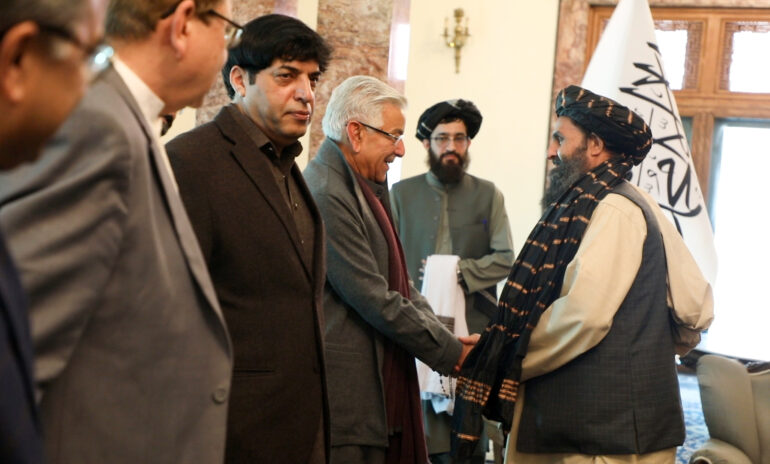Pakistan defence minister, Khawaja Mohammad Asif, and head of the country’s intelligence agency (ISI), General Lt Gen Nadeem Anjum, arrived in Kabul on Wednesday for talks with Taliban leaders.
The Pakistan foreign ministry said “A high-ranking delegation led by the minister for defence is in Kabul today to meet with officials of the Afghan interim government to discuss security-related matters including counter-terrorism measures.”
The Pakistani delegation met the Taliban’s deputy prime minister for economic affairs, Mullah Abdul Ghani Baradar.
Mullah Baradar’s office said: “The two parties discussed economic cooperation, regional connectivity, trade, and bilateral relations during this meeting.” Adding that “security concern should not affect the business and economic matters between the two neighboring countries.”
The visit comes at a time of growing violence in Pakistan and tensions between the two longtime allies. It also follows the Taliban’s closure of the Torkham border crossing, a key transit point between Afghanistan and Pakistan, on Sunday.
The border has remained closed for the fourth consecutive day, leaving hundreds of truck vehicles stranded on both sides of the border.
| Pakistan security forces kill 12 TTP fighters linked to Afghanistan
| Pakistan warns the Taliban: do not provide sanctuaries to terrorists
| Weapons left behind by the US in Afghanistan are used in by militants in Kashmir
According to Mullah Baradar’s office, he asked the Pakistani delegation to release Afghan citizens detained in Pakistan and “passengers at Torkham and Spin Boldak should be well-facilitated, with special consideration being given to emergency patients.”
Pakistan has previously accused the Taliban of providing sanctuary to Tahreek-e-Taliban (TTP) and warned of targeting their hideouts inside Afghanistan.
Pakistan’s foreign minister, Bilawal Bhutto Zardari, stated at the Munich Security Conference that terrorist groups, including the TTP and Al-Qaida, were operating from Afghanistan. In response, the Taliban expressed anger, stating that Pakistan’s recent insecurity was not new, advising it to discuss bilateral issues “face-to-face” with the group.
After the deadly mosque bombing in Peshawar on 30 January, Pakistani leaders reportedly sought direct intervention from the Taliban’s supreme leader, Mullah Hibattulah Akhundzada, to control the TTP.
On 17 February, the TTP carried out an attack on the Karachi police headquarters, killing at least 4 people and injuring 14.




